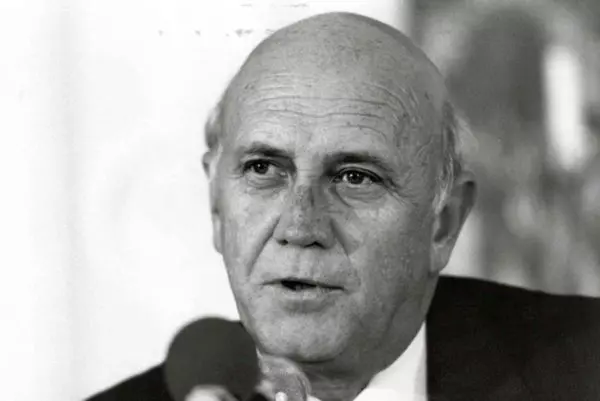
Frederik Willem de Klerk, also known as F.W. de Klerk, was diagnosed with mesothelioma in March 2021. De Klerk served as president of South Africa from 1989 to 1994, ruling over the last years of apartheid. In 1990, he released Nelson Mandela from jail. Together, they negotiated to move from the white-minority rule to universal suffrage.
According to a statement from his foundation, de Klerk began undergoing immunotherapy treatment in late March 2021. The statement reads there is no immediate threat to de Klerk’s health and the foundation hopes treatment proves successful.
F.W. de Klerk’s Lasting Impact on South Africa
F.W. de Klerk was born in Johannesburg, South Africa, in March 1936. After studying law, de Klerk pursued a political career. He was elected to Parliament for the National Party in 1973.
During this time, an all-white government ruled South Africa. This era is known as apartheid, which was a system of racial segregation. Records show de Klerk supported apartheid policies while he was in Parliament.
In 1989, de Klerk became State President of South Africa. At the time, many assumed de Klerk would uphold these policies of white privilege. However, he recognized the policies were causing harm to South Africa, politically and economically. De Klerk quickly worked to reform and dismantle the apartheid system. His goal was to transition South Africa to a democracy with equal rights for all.
Winning the Nobel Peace Prize With Nelson Mandela
As part of de Klerk’s actions to dismantle apartheid, he released Nelson Mandela from prison in 1990. Nelson Mandela was the leader of the liberation movement in South Africa.
In 1944, Mandela had joined the African National Congress (ANC), a political party that spearheaded the fight to end apartheid. As Mandela moved up through the ranks in this party, he faced repeated arrests for rebellion against the government. In 1962, he was arrested and sentenced to life in prison on charges of sabotage.
Mandela served his prison sentence for 27 years before de Klerk released him. The two negotiated to fully dismantle apartheid and create a new constitution. With these new policies, there would be equal voting rights for everyone in South Africa.
De Klerk and Mandela were awarded the Nobel Peace Prize in 1993 as a result of peacefully ending apartheid.
That same year, de Klerk apologized for the impacts of apartheid. In 1994, a non-racial election was held and won by Nelson Mandela. De Klerk continued to serve as Mandela’s executive deputy president until 1996. He retired from politics the following year.
F.W. de Klerk Undergoing Immunotherapy for Mesothelioma
During his 85th birthday celebration on March 18, 2021, de Klerk announced his mesothelioma diagnosis. The rare cancer is caused by asbestos exposure. It can take 10 – 50 years after exposure for symptoms of mesothelioma to present. At this time, it has not been publicly announced how de Klerk may have been exposed to asbestos.
The F.W. de Klerk Foundation announced de Klerk would begin immunotherapy the following week of March.
Immunotherapy has shown promise as a mesothelioma treatment. Most recently, the U.S. Food and Drug Administration (FDA) gave Fast Track designation to immunotherapy drug ONCOS-102. The FDA granted this status because ONCOS-102 showed promising survival benefits for mesothelioma in clinical trials. This means the drug will have an accelerated review process and could become more widely available sooner.
Some other immunotherapy drugs have already received FDA approval for mesothelioma. The immunotherapy combination of Opdivo®️ (nivolumab) and Yervoy®️ (ipilimumab) has been approved for the treatment of unresectable pleural mesothelioma. The approval came after clinical trials showed survival benefits from the immunotherapy drugs compared to chemotherapy.




